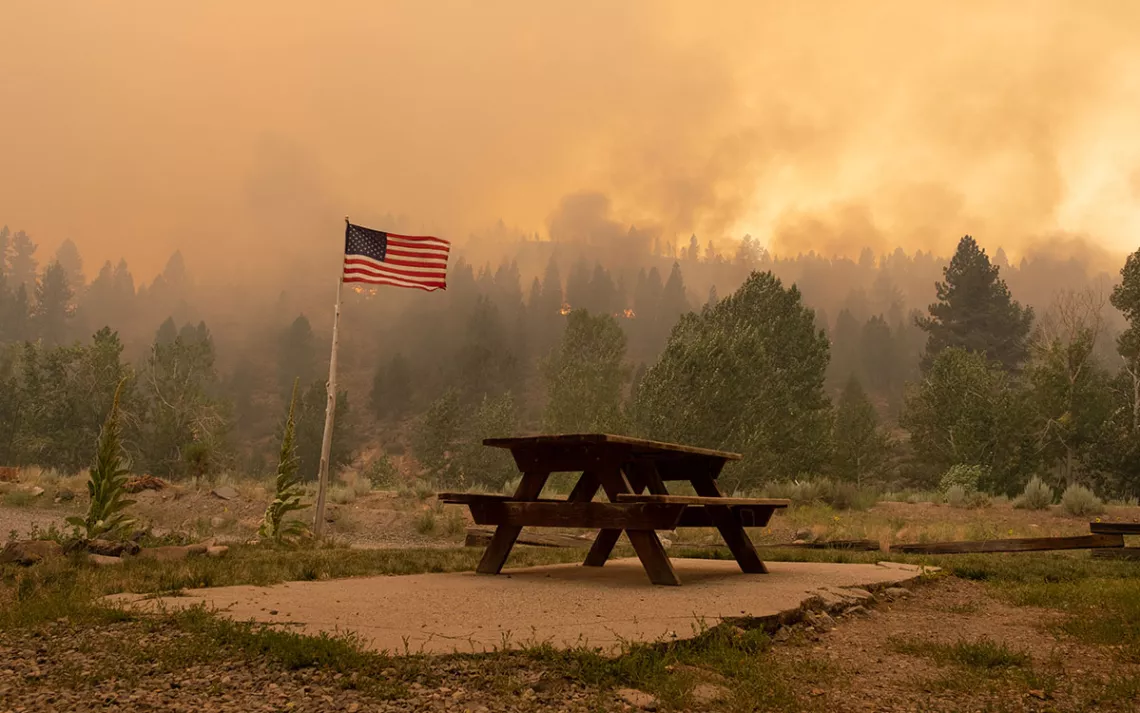New Federal Legislation Proposes to Make Polluters Pay for Climate Change
The bill follows similar legislation at the state level

Photo by David Odisho/Bloomberg Creative/Getty Images
On the heels of what has been one of the hottest summers on record in the United States, Democratic lawmakers on Capitol Hill recently introduced new legislation that aims to make fossil fuel corporations help foot the bill for the escalating costs of climate change. The move comes after states have started advancing similar proposals, including one recently enacted into law in Vermont. The state and local efforts are part of a growing nationwide push to hold the fossil fuel industry accountable for mounting climate-related damages.
“From sweltering heat waves to rising sea levels to ever more intense storms, our planet is screaming out every day for us to take action on global warming,” said Senator Chris Van Hollen, a Democrat from Maryland and one of the cosponsors of the legislation, in a statement. “And after fueling the climate crisis for decades, big polluters can no longer run from their responsibility to address the harm they have done.”
On September 12, Van Hollen and Representatives Jerry Nadler of New York and Judy Chu of California introduced the Polluters Pay Climate Fund Act, which aims to generate $100 billion in revenue each year over 10 years—or $1 trillion in total.
The bill, modeled after the federal Superfund law, would require the largest fossil fuel extractors and refiners in the US, including foreign companies doing business here, to pay into a Polluters Pay Fund. The amount each company owes would be based on the share of global greenhouse pollution attributable to them. Only the biggest polluters would be required to pay into the fund; the proposed law defines that as companies responsible for generating over 1 billion tons of carbon emissions from 2000 to 2022. The revenue would be used to help finance various climate mitigation and adaptation efforts, such as upgrading infrastructure to be more resilient to extreme weather, mitigating the impacts of pollution in frontline communities, and providing climate-related disaster assistance.
“This fund would be a big, big step forward in our efforts to address the damages caused by climate change,” Van Hollen said.
Those damages are already costing American taxpayers billions of dollars. In 2023 alone, the United States experienced 28 distinct billion-dollar climate and extreme weather disasters, totaling more than $92 billion in damages. Supporters of the legislation say these costs should not fall entirely upon consumers and taxpayers.
This fund would be a big, big step forward in our efforts to address the damages caused by climate change.
“The fossil fuel corporations responsible for worsening the climate crisis continue to reap massive profits while assuming none of the cost for the harmful emissions they produce, leaving taxpayers on the hook to pay the price. It’s past time for these corporations to pay their fair share,” said Representative Chu.
The legislation directs the Treasury Department, in partnership with the Environmental Protection Agency, to administer the fund and to determine how much each company owes. Backers say it will not raise energy costs for consumers.
“It doesn’t add to the marginal costs of production, and it only hits the biggest fossil fuel companies, leaving many other companies in the market to compete with on price,” Van Hollen explained.
The American Petroleum Institute, the industry’s chief lobbying group representing the biggest oil and gas companies in the country, did not immediately respond to a request for comment.
The proposed federal action is not a substitute for climate lawsuits targeting fossil fuel companies, as the bill has explicit language saying it would not preempt legal claims from states and municipalities seeking to recover climate damages. It would also not preempt climate Superfund or polluter-pays legislation at the state level.
Currently, there are more than two dozen lawsuits in courts around the country brought by state and local governments against major oil and gas companies. The lawsuits hone in on the industry’s alleged deception on climate change and the scientifically demonstrated role of fossil fuels in driving global warming. Additionally, some states are taking up legislation aiming to make the industry pay for climate-related costs incurred by the states. Vermont made waves in May when it became the first state to enact its climate Superfund bill into law. In New York, the state legislature recently passed a similar bill, and climate activists are ramping up pressure on Governor Kathy Hochul to sign it into law. Lawmakers in Massachusetts, Maryland, California, and New Jersey have put forward their own versions of this legislation.

Sign up to receive Sierra News & Views
Get articles like this one sent directly to your inbox weekly.
With this action you affirm you want to receive Sierra Club communications and may vote on policy designated by the Sierra Club Board.
The federal Polluters Pay Climate Act, supporters say, helps propel the momentum for climate accountability from the state level to the national stage.
“This legislation builds on important progress being made in the states, including the landmark Climate Superfund Act passed in Vermont this year,” said Sara Chieffo, vice president of government affairs at the League of Conservation Voters.
Van Hollen initially introduced a version of this legislative proposal in 2021, but a bill was never drafted and it fizzled out. Then states started taking up the issue, which helped lay the groundwork for getting a federal bill introduced. And having federal legislation proposed, regardless of its chances of passage, brings even more attention to the issue, climate advocates say.
“I think also having it at the national level and making people aware this is so serious, so leaders in Congress are willing to put up a fight, is really huge,” Cassidy DiPaola, spokesperson for Make Polluters Pay campaign, told Sierra. “It is unlikely that this bill would pass in the current session, but its introduction serves to build momentum and awareness for the concept.”
Van Hollen acknowledged that the legislation has slim chances of swift passage through a sharply divided Congress. “[These bills] don’t pass overnight,” he said during the September 12 press briefing. “But when you build that momentum and you build that public energy behind them, you can get them over the finish line when the political stars align.”
That is exactly what happened in Vermont, which saw its Climate Superfund Act pass with tripartisan support in just a single legislative session. The state’s Republican governor allowed it to become law without his signature.
“Vermont passed a climate Superfund law earlier this year, because lawmakers understood that the companies causing climate disruption need to help pay to clean it up,” said Lauren Hierl, executive director of the Vermont Natural Resources Council. “We know that small, rural communities around the country can't bear these burdens alone, so we're excited to see the introduction of the federal Polluters Pay Climate Fund Act.”
“The enormity of the climate crisis really can’t be overstated,” DiPaola said. “This legislation aims to rebalance the scales of justice.”
 The Magazine of The Sierra Club
The Magazine of The Sierra Club



